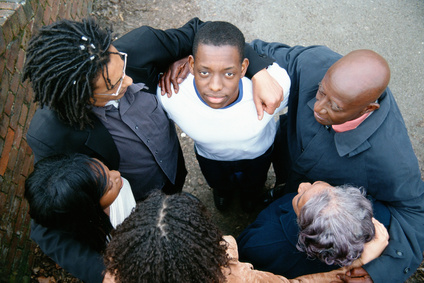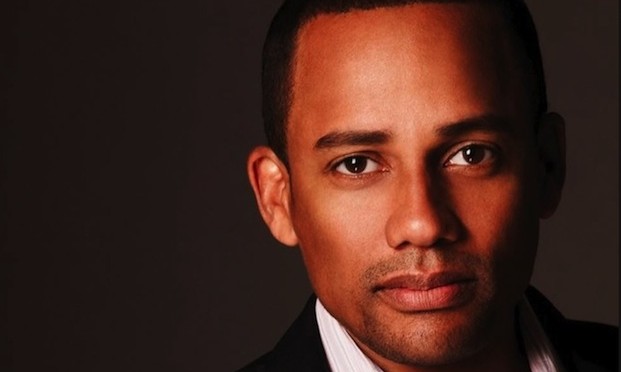Baring their Souls: More middle-class blacks are turning to therapists
By Charisse Jones / USA Today (This is a vintage article which we carried over from the previous website because it’s still informative.)
It took the death of his twin for Roland Poindexter to realize he didn’t have to be weak, or white, to need counseling. And when he sat inside the psychologist’s office, the issues that came tumbling to light went far beyond the loss of his sister. “I remember talking about the first time somebody called me a n—–,” says Poindexter, a black television executive in Los Angeles. “I remembered talking to the psychologist about my anger over how I and other people like me were treated in college.”
Poindexter is among the growing number of middle- and upper-class blacks who are turning to therapy. Traditionally, black Americans have shunned therapy as something for white people. Instead they have turned to family, friends and the church for help in coping with life’s travails.
Now that is changing.
To a large degree, the trend is a by-product of success. More black professionals are facing the same workplace pressures that whites have encountered for decades. Good jobs mean they have the money, or health benefits, to afford counseling. And the mobility that comes with good careers can mean separation from family and other traditional sources of support.
But other factors are at play, too. For the first time, black churches are giving their blessings to counseling. And the number of black psychologists and other mental health professionals is growing dramatically. Blacks who may have been reluctant to bare their souls to a white therapist can now find one who is black.
There are no statistics on the numbers of blacks in counseling, but anecdotal evidence is ample:
A Washington, D.C., practice that has eight black psychologists has a waiting list for patients and is considering opening another office in the Maryland suburbs. A psychologist in Houston says the percentage of patients she counsels who are black has grown from 15 percent eight years ago to 70 percent today. A mental health
clinic in south-central Los Angeles that serves the poor reports an increase in well-paid blacks as well. “Without a doubt, the number of blacks going to counseling is increasing,” says Halford Fairchild, associate professor of psychology and black studies at Pitzer College in Claremont, Calif.
Families far away
The extended family is still the choice for many blacks who need help. But money, education and lifestyle often create a distance between successful blacks and those traditional touchstones. “It’s a long-distance call now, a time-zone difference,” says Cathy Runnels, a speech pathologist who lives on the East Coast and has been in counseling off and on for the past seven years. And even when families are there for support, Runnels says, they “can give you love, but I don’t think a family can give you therapy. … At some point, you have to look at an issue with a different eye, from an objective perspective.”
The problems facing middle- and upper-class blacks who are in counseling often are the same as those facing whites: How do you find happiness while striving for success? How do you balance work and kids?
But experts say blacks’ struggles are made worse by the undercurrent of race, such as the feeling one must be the standard bearer for an entire group of people. Professional disappointments run deeper when skin color appears to be the only thing holding you back.
“Most are really frustrated they can’t make it, given their education and skills,” says Sandra Cox, executive director of The Coalition of Mental Health Professionals Inc. in Los Angeles. There is still that glass ceiling, that racist ceiling, that keeps them from rising. So they come to me in rage and in anger that it’s still not a level playing field.”
Poindexter says his color has never caused him problems in the workplace. But race still is a burden in his life. “You always feel you’re being judged on a different level,” he says. “You know that if you’re surrounded by two or three other black people where you work, you’re all there representing the race, and it’s an enormous burden. I think it’s something most of us take on willingly, but it does weigh on your daily existence.”
Although black men remain more reluctant to seek counseling than women do, Poindexter says he has encouraged several of his male friends to follow in his footsteps. Most have. “In many ways we are desperate for answers,” he says. “I don’t think that my sense of being lost in this society is unique at all. So I think if people have the
opportunity to go, certainly in my peer group, they’re going.”
More blacks also consider counseling an option for their children.
“You’re going to find that with African American children, people are also looking for therapists who are aware of issues of rites of passage and a need for a healthy identity for African American children and teen-agers as they are moving into a community that still has stereotypes about them,” says V. Stewart, a psychologist in Flint.
Still, there remains some resistance. Blacks, already burdened with
stereotypes, fear being labeled “crazy” as well. Professionals in particular worry about their visits to therapists winding up in work records and hurting their careers. And like those of other races who are in therapy, blacks may fear how friends and loved ones will react.
Michelle Smith-Ballard remembers going by her mother’s house after her first counseling session. “I broke down crying and I went to my Mom for a hug,” she says. “And she pushed me away and she said, ‘I really don’t like seeing you this way.’ After I got that reaction from her, I was very cautious about who I told.”
Sandra Rowe says there are times her clients will act like they don’t know her. “I run into clients all the time in social situations,” says Rowe, a Los Angeles psychologist whose black clientele has risen during the past five years. “Some people have no problems. Others may not speak. I leave it up to them. If they don’t acknowledge me, I don’t acknowledge them.”
Various forces are changing these attitudes. Essence, a black woman’s magazine, has run an advice column by a psychologist for more than a decade. BET Weekend, a black entertainment magazine, began a similar column this month. A number of inspirational books by black authors, such as Acts of Faith: Daily Meditations for People of Color by Iyanla Vanzant, have made many comfortable with the psychological premise of self-reflection. And some even credit black motivational speakers like Les Brown with making the preservation of one’s mental health a priority.
More help available
But the two most significant factors in more blacks seeking counseling may be the increased number of black mental health professionals and the permission being given by the clergy to seek them out. “Because psychological assistance or counseling was primarily provided by whites, there was a fear based on reality that the last thing one should turn over to the white community was one’s mind,” says Frederick Phillips, a black psychologist practicing in Washington.
The number of black psychologists who are members of the American
Psychological Association has risen from 848 in 1989 to 1,292 today. And thousands of others, from psychiatrists to social workers to therapists, are offering some form of counseling.
Many blacks are demanding that their managed-care health plans include more black counselors on referral lists.
“I found that the first person I went to couldn’t relate to what I was saying,” says Smith-Ballard, a project accountant for a construction firm in LosAngeles who went to a white counselor before finding Rowe. “I said something about ‘Miss Thing,’ (a slang term for an uppity woman) and she just sat there. When I told that to Sandra, she fell out laughing and we were talking about Miss Thing all day. There’s something about relating, having the same experience, and empathizing.”
An understanding of spirituality frequently is an issue that requires common ground. “The church is a very important important part of the African American community, so in a counseling session the issue of prayer and spirituality is an aspect that African Americans expect the counselor to be aware of,” Stewart says. Brenda Lampkin, 48, is a Houston school teacher who has been in therapy for a little more than two years and has encouraged her grown children to seek
counseling. She argues with those who discourage therapy and say God has all the answers: “God does his work through people, and if we don’t allow ourselves to get the strength through them, we’ll never solve our problems.” Traditionally, black churches have told their members they can find the answers to life’s problems in prayer. Now a growing number of ministers are recognizing that counseling is helpful. “There’s an acknowledgement that the two (psychologists and churches) can work together,” says Patricia Wallace, a Detroit psychologist.
Churches like Windsor Village United Methodist in Houston and West Angeles Church of God in Christ in Los Angeles have counseling centers and offer referrals to therapists. The pastor of Mt. Calvary Baptist Church in Akron, Ohio, invites psychologists to speak from the pulpit during revivals. “That happens a lot in Detroit. That’s not uncommon at all,” Wallace says of psychologists being invited to speak at churches. “There’s not a dichotomy in certain religious orders.” The reasoning is simple, says the Rev. Jeffrey Dennis of Akron’s Mt. Calvary. “We feel if we can deal with some spiritual issues, we can bring wholeness to people’s lives. And that’s what salvation is.”
Therapists need to be culturally sensitive
By Charisse Jones / USA Today
The stigma of therapy has decreased over the past decade for everyone, regardless of race. In pop culture, counseling even seems hip. Witness TV’s Frasier, a sitcom about two brothers who are psychiatrists. “There’s an awareness of what the field is about — an acknowledgement that there’s no correlation between crazy and getting some help,” says Patricia Wallace, a psychologist based in Detroit.
The softening of the stigma among blacks has been the most pronounced. But a growing number of Hispanics and Asian Americans are overcoming cultural barriers and seeking help. Unlike blacks and whites, Hispanics and Asian Americans find a shortage of bilingual, culturally sensitive counselors to meet their needs.
And experts say that a counselor who does not understand a client’s cultural nuances can cause more harm than good.
“For example, Asian-American students have difficulty divorcing
themselves from their parents,” says William Liu, a doctoral candidate in psychology and professor of Asian-American studies at the University of Maryland. “They come into counseling feeling depressed and the counselor will say, ‘You should do what makes you happy,’ which is not necessarily the best thing to do because it throws them into even more conflict.”
Hector Machabanski, a Chicago psychologist who works mostly with
Hispanics, says a lot of the stigma is “primarily based on not having
appropriate information or associating mental health services with extreme issues like mental retardation or schizophrenia.”
Increasingly, he says, “there’s more understanding that problems of everyday life can be attended to.”


